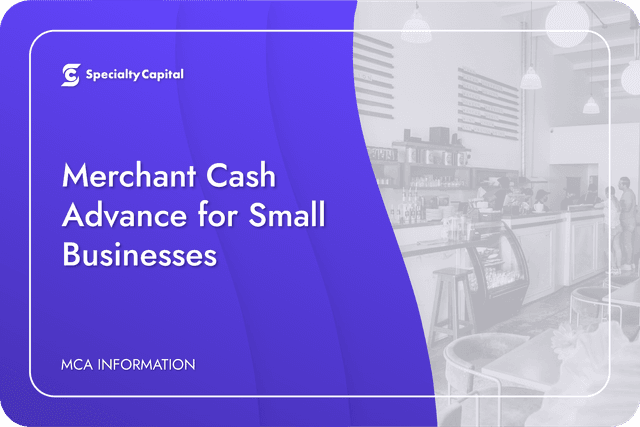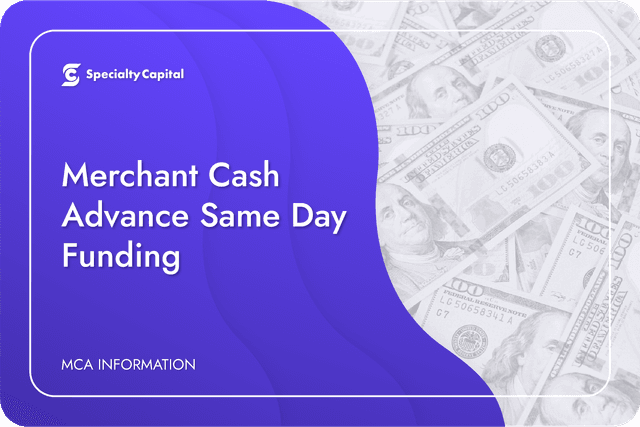If you need capital to grow your business, the options are endless. Two common types of small business financing include business term loans and merchant cash advances, or MCAs. Both types of financing offer unique benefits that can be the deciding factor as to which one you should choose. In this guide, we’ll compare a merchant cash advance vs a traditional loan head to head so you can make the best decision for your business.
A merchant cash advance is great for businesses that suffer from less-than-perfect credit because of the more lenient approval process. Because funders use your business’s card sales to determine the terms of your financing, this opens the door to businesses that might not otherwise qualify for financing.
Another benefit of an MCA is the lack of additional collateral. You won’t need additional assets to qualify for a merchant cash advance outside of your business’s card sales.
If you need to secure funding quickly, some MCA funders are able to fast-track your application and approve funding quite quickly. Your funder will conduct research on your business history, but there’s no need for additional appraisals for your assets because they aren’t used to qualify.
Do you need financing for a variety of expenses? A merchant cash advance doesn’t put restrictions on how you plan to use your capital like other forms of financing. This gives you more flexibility to run your business and invest in areas with the largest impact on your bottom line.
Finally, MCAs offer a unique remittance schedule that’s based on your business’s card sales instead of fixed monthly payments that come with many types of financing. For this reason, an MCA can help your business overcome cash flow obstacles and reduce the likelihood of your business becoming “underwater” on your financing because your remittance amount is determined by your business’s actual revenue. This is especially important for businesses that grow through large swings in revenue due to seasonality.
Business term loans are best for businesses that may not have a significant amount of revenue or they are in the pre-revenue stage.
Because of the more restrictive and regulated nature of this type of financing, it can be much more affordable with lower overall costs when compared to a merchant cash advance.
If your business operates better with structure, business loans offer fixed monthly payments so you know exactly how much you’ll need to pay each month – regardless of your revenue.
Additionally, some types of business loans, like SBA Express loans, can be funded very quickly in a matter of a few days or less. If you have a strong relationship with your bank, they may be able to approve and fund your loan within the same day on some occasions.
Finally, business loans offer the ability to build credit as you repay your loan, which can be beneficial later in your business journey.
A merchant cash advance is a type of revenue-based financing that utilizes your business’s card sales as collateral for your financing. Whereas many traditional small business financing options will require significant collateral or personal guarantees, a merchant cash advance uses your business’s card sales as a form of collateral instead.
The repayment terms of your financing will be determined by your business’s credibility and a factor rate will be applied to your financing amount. In most cases, this will range from 1.2x to 1.4x, but it will depend on your funder and several other tertiary factors. In your agreement, you will commit to a certain percentage of your daily or weekly card sales to repay the financing. For instance, you may agree to repay 10% of your card sales revenue until the financing is paid in full. Because of the flexible nature of this type of financing, the amount of time it can take to repay the full amount will vary and be dependent on your actual card sales.
A merchant cash advance is not a loan and therefore is less regulated and restrictive than a traditional loan.
A business loan is a traditional loan where you borrow a lump sum amount of money that is paid back in fixed intervals until it is paid in full. Interest rates can be either fixed or variable and will depend on the funder you work with and current market rates.
The application process can be more stringent than with other types of financing, but the overall cost of your financing tends to be more attractive.
Business loans come in all shapes and sizes. We’ll explore some of the most popular options below.
Some of the most common types of small business loans are business-term loans. These can be either short or long-term loans. In most instances, longer-term loans can be approved for larger amounts than short-term loans. Interest rates will vary depending on the funder and current market conditions and a down payment of some amount is often required for approval.
Within these types of loans are secured and unsecured loans. Secured loans require collateral to back your financing, but come with much more attractive interest rates compared to unsecured loans. Unsecured loans do not require collateral for approval, but they do come with higher interest rates and may require a personal guarantee depending on the funder or bank you work with.
SBA loans are another popular option for small and medium-sized businesses looking to secure capital. There are several types of SBA loans, but the most common is the SBA 7(a) loan. These are strictly limited to small and medium-sized businesses, as defined by the SBA, and can be advantageous for a few reasons.
These loans are much more flexible than a traditional term loan. Your credit history and personal credit score are not as impactful as with a traditional loan. Interest rates are also capped, which can make your financing much more affordable if you have a weak credit score. Finally, they require lower down payments that open up eligibility to borrowers who may otherwise not qualify for a traditional loan.
However, SBA loans are limited in their uses and financing amounts – so you’ll need to check to see if it will work for your business needs. You’ll also need to sign a personal guarantee – meaning your personal assets can be at risk if you are unable to make future payments.
If you need capital to grow your business, both a merchant cash advance and a conventional loan could be viable options. To determine which is a better fit for your business, there are a few scenarios you should explore.
If your business has stable credit and debit card sales but you lack additional collateral or have a subpar credit score – a merchant cash advance might be better suited for your business.
It’s worth noting that not all merchant cash advance products are the same. For example, with Specialty Capital – you can secure industry-leading prepayment discounts and a multi-draw advance offering that allows you to draw from a revolving line of credit similar to a line of credit. In this case, if you’re able to pay back your advance early, you can save a substantial amount.
If you’re looking for the most affordable type of financing and you can meet all of the different requirements and qualifications for a traditional loan – a business loan can often be a better solution.
While more restrictive, conventional business loans offer a more structured form of financing with straightforward interest rates and payment amounts. You can also secure larger financing amounts that aren’t dependent on your business’s revenue.
Overall, the right financing option will depend on your business’s circumstances. If you operate a business without significant revenue or business history, you will likely be limited to a business loan. However, if you have stable revenue and business history, an MCA can be a more lenient way to secure the capital you need. Always weigh the pros and cons of each type of financing to find which better suits your business.

Merchant Cash Advance for Small Businesses (Benefits & Requirements)
When small businesses need financing, they have a range of financing options to choose from. But many opt for a merchant cash advance (MCA) because...

Merchant Cash Advance Same Day Funding
A merchant cash advance (MCA) is a great financing option when you need same-day funding, but there are certain requirements, restrictions, and dra...

How to Get out of a Merchant Cash Advance
A merchant cash advance (MCA) can be great when you need short-term financing that’s easy to secure, but what happens if you want to get out of an ...